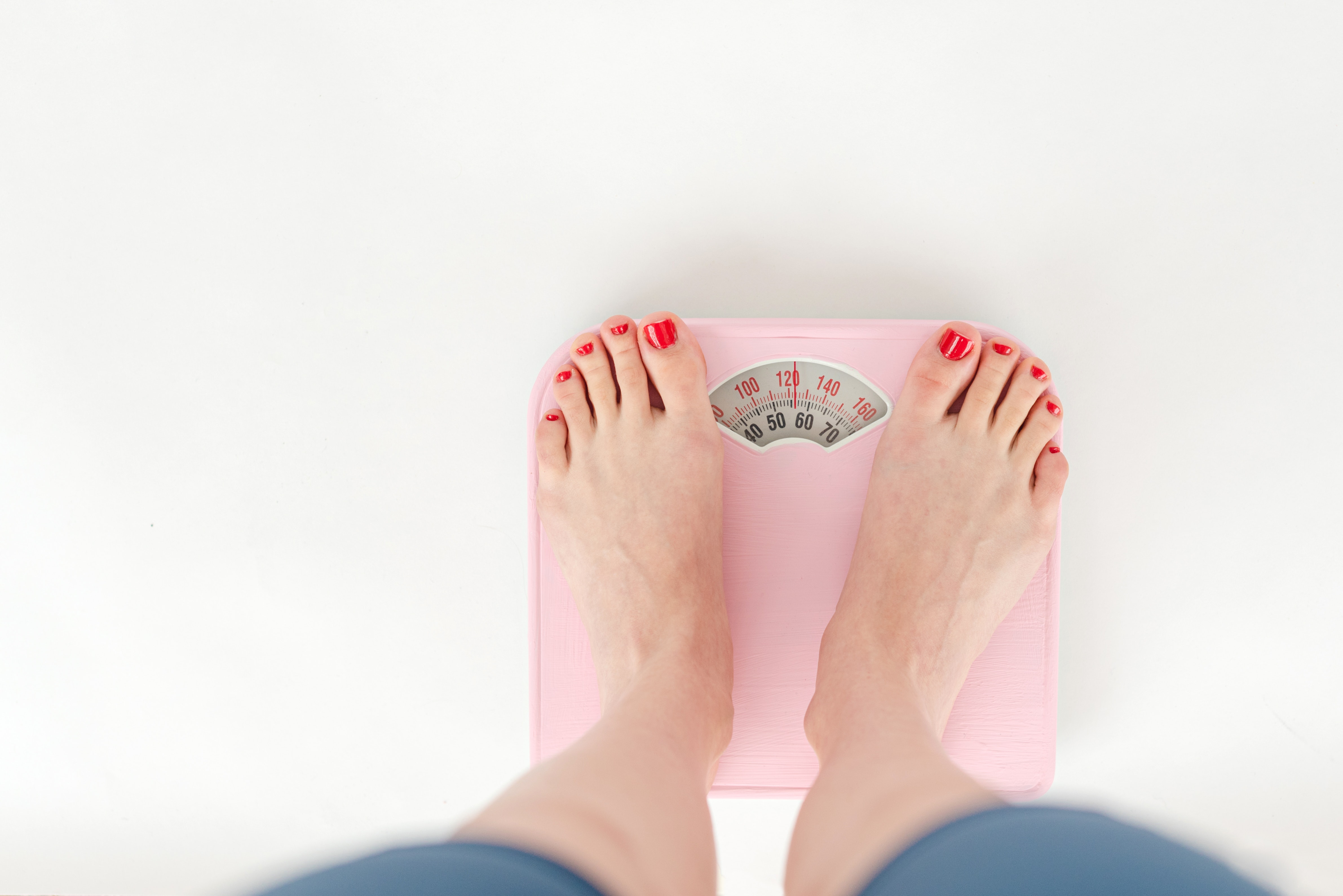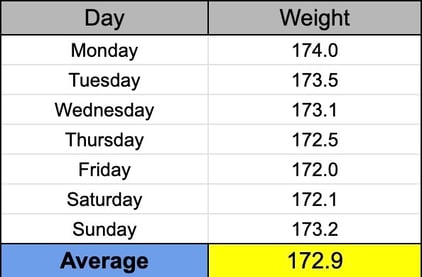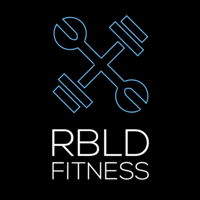A Guide to Weighing Yourself: Helpful Facts, Practices, and Reminders
For many years, the number on the scale each morning was a source of tremendous confusion and emotional turmoil for me, but when I learned the information you're about to read in this article, my entire viewpoint changed. That knowledge empowered me to make profound changes, and it motivated me to push forward with my fitness plans until I eventually got the results I wanted.
I hope it does the same for you.
I'll provide the different options for how often a person can weigh themselves, the pros and cons of each option, my personal recommendations, and a summary of major points and best practices.
Enjoy!

Did you know these 4 facts about your bodyweight?
1. Changes in Bodyweight is primarily determined by fluctuations in: Body fat | Muscle mass | Water | Food
Whether it's for performance, aesthetic, overall wellness, or all of the above, I think most of us would agree that our fitness goals usually revolve around reducing body fat, building muscle mass and maintaining the results.
In the process of doing so, however, many of us get caught up in just losing weight in general, but what we often don't realize is that when they lose or gain weight, it's not necessarily an indication that we lost or gained body fat, especially from day-to-day. It could be that we've retained or flushed out water, ate, digested or passed food, gained or lost muscle mass, gained or lost body fat, or - most likely - some combination of all four components.
Simply put, while body fat contributes to total bodyweight, our total bodyweight number is determined by other major factors as well. And when we experience changes in bodyweight, we must note that it's not just body fat. It's also a result of fluctuations in water retention, food, and muscle mass.
This is one major reason why we should not make decisions about our diet and exercise based on the daily fluctuations of total bodyweight.
2. Bodyweight can fluctuate up to 5-6 lbs throughout the day
The average adult can fluctuate in bodyweight up to 5-6 lbs per day. That's a significant variable to consider when using numerical daily weight loss figures as a metric for progress, especially in a long-term fitness journey.
What's important to note, however, is that this upward fluctuation is mostly made up of retained water and food left in the system during digestion. This will eventually (1-3 days most likely) flush out, and your bodyweight number will return to the most accurate reflection of what it actually is without the retained food and water.
This is another major reason why it's so important not to judge your efforts or progress on a single day's weigh-in. It's also a great reason to pay attention to the next point.
3. The best time to weigh yourself is in the morning with the same conditions
The best shot at getting your "true" weight is by weighing yourself fist thing in the morning, on the same scale, after you've used the bathroom and "feel" the most empty while wearing minimal clothing.
This a common practice among those who are the most successful in long-term fat loss because they are getting the most accurate data of their bodyweight. While it's not necessary to weigh yourself each morning, there is an advantage to taking daily numbers and forming a weekly average from that number.
Regardless, if you want to get the most accurate "true" weight at any given time, this usually comes in the mornings (or, for midnight-shift workers, after you wake up from your longest sleep) and on an empty stomach.
I recognize that it may be difficult to isolate these factors every single day, but do what you can to keep the data pure so you can work with the most accurate and untainted numbers. If weighing yourself is one of the measurements you wish to use to monitor your progress, then this is a key reference point you need to properly establish and follow.
4. People typically weigh the least on Fridays and the most on Sundays
While there are no special fat-burning qualities floating in the air during weekdays, the behavioral data shows that people typically consume less and move more on weekdays while they typically consume more and move less on weekends. This is certainly true for me, and I usually see this trend reflect on the scale as well.
Remember though, while some of this added bodyweight is likely the result of a caloric surplus that will convert to storage of body fat, it's also usually accompanied by some food which will be digested, burned through TEF (Thermic Effect of Food), and passed. There's also the component of temporary water retention, especially if you've consumed high sodium foods and drinks. This almost always passes within 1-3 days of balanced dieting, exercising, reducing stress, etc.
As always, however, remember that a caloric surplus results in storage of body fat while a caloric deficit results in the burning of body fat. Do this consistently, and the amount of your total body fat will increase or decrease accordingly, as will your total bodyweight.
NOTE: Don't forget to prioritize strength training and protein intake throughout your weightloss journey.

How Often Should I Weigh Myself?
The frequency you weigh yourself is entirely up to you, but the best-practices for doing so remain the same:
- Same time of day: First thing in the morning (ideally), and after you've gone the the bathroom
- Same variables each time: Empty stomach, minimal clothing, and using the same scale (ideally)
However frequently you choose, just remember that the number on the scale reflects one number at one moment in the course of your entire life. It's not the end all be all. It's one datapoint about a change in your total bodyweight.
Here are some primary options regarding how frequently you could weigh yourself.
Option #1: Daily
One could make the argument that this is the most effective frequency because it helps with adherence to your daily diet and exercise plans.
Think about it. If your morning routine consists of an activity which forces you to reflect on the efforts you've put in so far as well as what you need to do in the future to meet your goals, then you'll be more likely to keep your diet and exercise top of mind throughout the day. It's an influential habit.
Daily Fluctuations
It's also beneficial to have a daily bodyweight number so you can take a weekly average of those 7 days. For example:

Notice that the weekly average is 172.9 lbs, but there are four days (Monday, Tuesday, Wednesday, and Sunday) that the weight was higher that this number. However, the other three days (Thursday, Friday, and Saturday) were much lower, and this lowered the average overall. If the person in this example was to continue to work at it with the exercise and diet they were adhering to, they'd likely see a similar trend downward the following weeks as well.
This not only shows how weight fluctuates throughout the week, but also the importance of viewing weight loss or gain in terms of weeks and months, not days.
Most smart scales (like this one that I use) come with an app that shows changes in your total bodyweight as well as body fat, water, and muscle mass percentages over time. It can be helpful to have a diversity of metrics to follow your progress because your total bodyweight number is not everything. Additionally, total body recomposition is a better measure for long-term health, confidence, and aesthetic.
All in all, while it's not necessary to use a smart scale, you might find the experience of using one, as well as the data you glean from it, to be more helpful than the scale you're currently using. Either way, it's important to start using the same scale each time so you can avoid variants in data from one scale to another.
Regarding daily weigh-ins, there are some strong benefits. A potential downside to weighing yourself daily, however, is becoming "obsessed" with the practice and number rather than the goal (body recomposition, overall health, muscle growth, mobility, emotional wellness, etc.).
If you sense yourself beginning to think too deeply about it, and it's affecting your mental health negatively, please consider reducing the frequency of weighing yourself. Also, think about using other metrics to round out your sense of progress (i.e. Strength, endurance, clothing size, blood markers, etc).
Option #2: Weekly
Some of my clients weigh themselves every Friday morning. Some, Mondays. Some, another day still.
It doesn't necessarily matter which day of the week you choose so long as you choose the same day and you're consistent with the diet and exercise as well as returning to the same methods to measure your progress. Having consistent reference points (i.e. bodyweight, size of body parts, body fat &, muscle mass &, etc.) is absolutely crucial to knowing if what you're doing is working or not.
Trust me, I'm fully aware of the intimidation that comes with stepping on the scale, which is why I want you to focus more on your daily habits than the number that displays on the screen when you weigh yourself. If you focus on creating solid, progressive habits, the number will consistently move closer to what you want it to be.
Option #3: Monthly or Random Frequency
Weighing yourself monthly or randomly is also fine if you feel happy doing so, but here are some potential concerns:
- The more infrequently you weigh yourself, the more likely you may be to lose personal accountability and motivation. You might be a person who likes constant check-ins. Or you might be more avoidant towards looking at the scale because of how it makes you feel. If I had my way, I'd make it so everyone weighs themselves multiple times per week (perhaps daily) and views that data without negative emotion, but rather as it is - helpful information. It's merely an indication that what you're doing is either helping you get closer or pushing you further from your goals. With that said, others might progress more quickly and joyfully by having more time in between weigh-ins. If so, you have my blessing. Whatever works for you.
- You may weigh yourself on a day or time that you're retaining water or have had a bad couple of dieting days strung together, and this could reflect a number on the scale that is not indicative of your "true" weight. It's entirely possible that, if you were to step on the scale a few days earlier or a few days later, that your total bodyweight would have been a few pounds lower. In other words, it's hard to get an accurate "average" weight with infrequent data pulls, and this inaccuracy of data could lead to frustration, burn out, or quitting.
Personally, I try not to go more than a few days without weighing myself, but again, it's totally up to you. I hope this information and the reasonings I've provided - which I've gleaned from research and personal experience - help you make an informed decision, and at worst, allow you to try one method while having the flexibility to pivot to another if it doesn't work out.
How Often Does Teddy Weigh Himself?
So, how often do I (Teddy) weigh myself?
The short answer is: 4 or more times per week. This varies based on whether or not something might skew what I believe is the true number that day (i.e. If I've eaten that morning; if I splurged the night before and I know the number will be spiked temporarily; if I haven't been able to use the restroom properly; or other factors like if I'm not home that morning or if my wife has held the master bathroom hostage).
Again, all of those variables can be avoided if I were able to weigh myself every single morning with roughly the same conditions. Even if some were skewed on individual days, the weekly average would even things out.
Additionally, I've learned to observe long-term trends over the course of weeks and months, not individual days. A weight loss/gain trend is far more indicative of progress/regression than a single day or week.

What Have We Learned? Summary and Best Practices
- Measuring your bodyweight is one tool to measure progress towards your goals. It's not EVERYTHING or even MOST things. Whatever tool you use to measure progress towards your goals, just be consistent so you know if what you're doing is working or not. Jumping around from one measurement tool to another is only going to screw with your head and cloud the data needed to make helpful decisions for your health.
- Changes in bodyweight are primarily determined by four things: Changes in the amounts of body fat, muscle mass, water, and food.
- Bodyweight can fluctuate up to 5-6 lbs throughout the day.
- Consistency of time, place, scale, etc. are necessary to get the most accurate measurement of your "true" weight.
- DON'T judge your success by the number on the scale from day-to-day. Instead, take a weekly or biweekly average of those daily weigh-ins.
- Taking an average of daily weigh-ins is an evidence-based best practice that provides much more accurate measurements than going by daily weigh-ins alone...not to mention less frustrating than riding the emotional roller coaster of the natural fluctuations of different times in the day and different days in the week.
- While there are numerous factors to gauge progress, it’s important to know how to capture a consistent and accurate reading of your bodyweight to know what's working and what's not in your fitness journey.
For what it's worth, our team and other experts recommend a weekly average of 0.4 - 1.0% of total bodyweight loss to maintain a steady flow of progress while also optimizing the growth/maintenance of muscle mass and prevention of injury and/or illness. Don't worry if you go above or below this range in any given week. Instead, focus on the average over the course of at least four weeks and beyond. Again, this is the ideal range to aim for.
Here's a helpful chart to gauge where you might fit according to our recommended pace:

Again, there are many metrics to measure progress (i.e. size of the body, how clothes fit, blood tests, lean mass measurement, body re-composition, how we look, etc.), but if weight loss (fat loss in particular) is something you're striving for, it can be very helpful to understand the best way to get accurate measurements when stepping on the scale.
The goal is to make decisions based on high quality and consistent data that reflects the true makeup of your body, not just a single number in that moment – something that often discourages people from continuing.
Your fitness journey is far bigger and more important than any single day, number or moment.
Remember who you are and why you're doing this. #StayTheCourse

Teddy Woolsey
I am the owner of the RBLD Fitness Unlimited Coaching Program and RBLD Fitness App
I also write about the intersection of fitness and sustainable behavior change
Let's connect on Instagram: @tedwoolsey
Our team at RBLD Fitness is here to help you at any time, whether it's through our flexible and affordable mobile app or if you're looking for a more hands-on coaching experience.
Visit our page to learn more.




